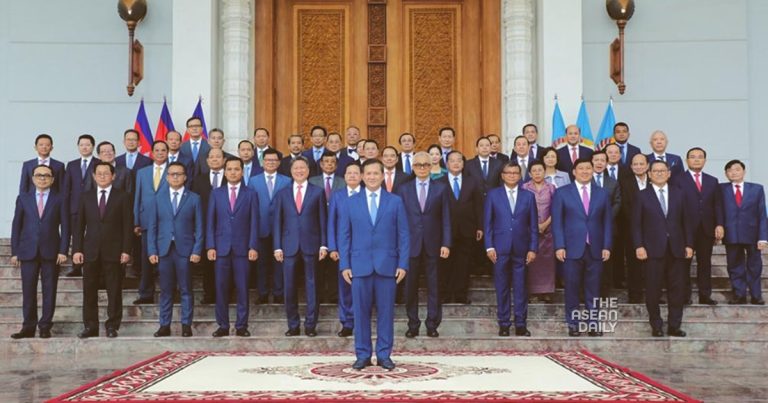11-8-2023 (PHNOM PENH) In a momentous move that reverberated across Cambodia, outgoing ruler Hun Sen introduced the nation to its new government on Thursday (Aug 10). At the helm stands his eldest son, and the lineage extends further as his youngest son and nephew also ascend to pivotal roles within the administration.
Hun Sen, at the helm of the Cambodian People’s Party (CPP), emerged triumphant, securing an overwhelming 120 out of 125 seats in the lower house during the July elections. The outcome of these polls was marred by allegations of being a farce, with the principal opposition party prevented from participating.
Shortly after clinching this resounding victory, Hun Sen, who holds the distinction of being one of the globe’s longest-serving leaders, made a startling announcement – a transition of power to his eldest son, Hun Manet, marking a turning point after a rule spanning nearly four decades.
The royal seal of approval was pressed upon this dynastic transfer of power when the Cambodian king bestowed the title of new leader upon four-star general Hun Manet, aged 45.
Publicized snapshots from a meeting captured a pivotal moment, featuring a confluence of outgoing and incoming government ministers. Hun Sen’s Telegram channel bore witness to these images, with a particularly telling photograph showcasing Hun Manet flanked by an assembly of approximately 30 incoming cabinet members.
Subsequently, Hun Manet shared these group portraits, underscoring that the bedrock of CPP’s sustained electoral dominance is intrinsically linked to the “solidarity and internal unity of the party.”
The impending shift in leadership heralds a strategic reshuffle within the Cambodian governmental echelons. Hun Sen’s youngest son, Hun Many, assumes the mantle of the minister of civil service. Parallels to fathers’ vocations emerge as the offspring of the interior and defence ministers seamlessly step into their patriarchs’ roles, as per a preliminary list detailing the new cabinet members, unveiled by AFP.
A notable addition to this matrix of governance is the outgoing PM’s nephew, Neth Savoeun. As the potent national police chief, Savoeun ascends to the status of deputy prime minister, further consolidating the intricate tapestry of familial influence.
Hun Sen’s enduring presence within the Cambodian landscape traces back to his past as a former Khmer Rouge cadre, ascending to power in 1985. In defiance of international criticism that cast a shadow on the fairness of last month’s electoral process, he brushed aside these allegations, citing a pragmatic motive. He contended that this transfer of authority was executed to avert the spectre of “bloodshed” in the event of his demise while in office.
Yet, human rights organizations stand united in their assertion that Hun Sen has harnessed the legal apparatus to quash any manifestations of opposition during his reign, resulting in the imprisonment of numerous activists.
As Hun Sen orchestrates his retreat from the frontline of political leadership, a calculated stratagem unfolds. He is poised to assume the mantle of president of the Senate in the early months of the upcoming year, further embellished by an interim role as acting head of state during the monarch’s overseas sojourns.
This transition, however, does not signal an absolute departure from the corridors of influence. Hun Sen proclaimed his intention to continue wielding his prowess in various capacities, pledging his allegiance to the nation’s pursuits until at least 2033. A new chapter unfolds, laden with expectations and nuances, as Cambodia navigates the contours of this dynastic transition.




